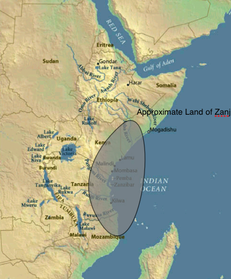 Source: http://cfsafricanhistory.wikispaces.com/Land+of+ZandjAl-Mas'sudi was an early Arab traveller. He was born in Baghdad and died in Cairo in the tenth century. He made his journey in 916 AD.
Source: http://cfsafricanhistory.wikispaces.com/Land+of+ZandjAl-Mas'sudi was an early Arab traveller. He was born in Baghdad and died in Cairo in the tenth century. He made his journey in 916 AD.Al-Mas'sudi's writings:
The sea of the
Zanj reaches down to the country of Sofala and of the Waqwaq which produces gold in abundance and other marvels: its climate is warm and its soil fertile....
The land of Zanj produces wild leopard skins. The people wear them as clothes, or export them to Muslim countries. They are the largest leopard skins and the most beautiful for making saddles.... It is there that the Zanj built their capital: then they elected whom they called Waklimi. This name ...
has always been that of their sovereigns. The Waklimi has under him all the other Zanj kings, and commands 300 000 men....
The Zanj use the ox as a beast of burden, for their country has no horses or mules or camels and they do not even know these animals. Snow and hail are unknown to them as to all the Abyssinians. Some of their tribes have sharpened teeth and are cannibals. The territory of the Zanj begins at the canal which flows from the Upper Nile and goes down as far as the country of Sofala and the Waqwaq. Their settlements extend over an area of about 700 parasangs in length and in breadth; this country is divided by valleys, mountains and stony deserts; it abounds in wild elephants but there is not so much as a single tame elephant....
Although constantly employed in hunting elephants and gathering ivory, the Zanj make no use of ivory for their own domestic purposes. They use iron instead of gold and silver....
To come back to the Zanj and their kings, the name of the kings of the country is Waklimi which means supreme lord; they give this title to their sovereign because he has been chosen to govern them with equity. But once he becomes tyrannical and departs from the rules of justice, they cause him to die and exclude his posterity from succession to the throne, for they claim that in thus conducting himself he ceases to be the son of the Master, that is to say of the king of heaven and earth. They call God by the name of Maklandjalu, which means Supreme Master....
The Zanj speak elegantly, and they have orators in their own language. Often a devout man of the country, passing in the midst of a numerous crowd, addresses to his listeners an exhortation in which he invites them to serve God and submit to His orders. He points out the punishments which disobedience must entail, and recalls the example of their ancestors and their ancient kings. These peoples have no code of religion; their kings follow custom, and conform in their government to a few political rules. The Zenj eat bananas, which are as abundant with them as in India, but the basis of their food is dorrah, a plant called kalari which they take from the ground like a truffle, and the elecampane root....
They also have honey and meat. Each worships what he pleases, a plant, an animal, a mineral. They possess a great number of islands where the coconut grows, a fruit that is eaten by all the peoples of the Zanj. One of these islands, placed one or two days' journey from the coast, has a Muslim population who provide the royal family; it is the island of Kanbalu....
[Tusks from the country of Zanj] go generally to Oman, and from there are sent on to China and India. That is the route they follow and were it otherwise, ivory would be very abundant in Muslim countries. In China the kings and their military and civilian officers use carrying-chairs of ivory; no official or person of rank would dare to visit the king in an iron chair, and ivory alone is used for this purpose.... Ivory is much prized in India; there it is made into handles for the daggers known as harari ... as well as for the hilts of curved swords.... But the biggest use of ivory is in the manufacture of chessmen and other gaming pieces....
Sources: This text has been constructed out of two documentary sources to give you an impression of what they are like. The serious student might like to read the original versions. The first source is Basil Davidson, African Civilization Revisited: From Antiquity to Modern Times. Trenton, NJ, Africa World Press, 1991 pp.132-4. The second source is G.S.P Freeman-Grenville, The East African Coast. Select Documents from the First to the Earlier Nineteenth Century, London, Rex Collings, 1975, pp.14-17.http://www.sahistory.org.za/archive/chapter-2-beginnings-globalisationThe Zanj slaves rebellion, AD 869-883https://libcom.org/library/zanj-slaves-rebellion-ad-869-883http://en.wikipedia.org/wiki/Zanj_Rebellion